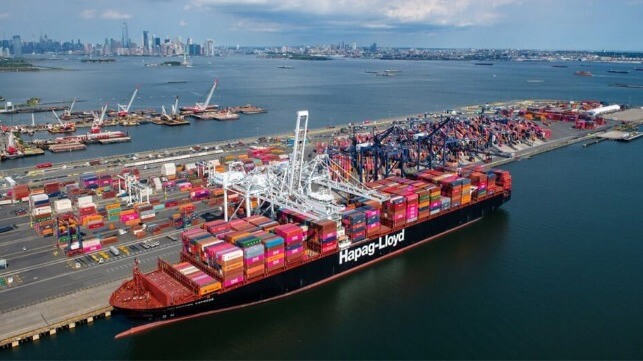Hapag-Lloyd Sets Work Disruption Surcharge for US East/Gulf Coast Ports
Concerns Rise Over Potential Longshoremen's Strike

As tensions mount over unresolved labor contracts, fears of a longshoremen’s strike loom large over U.S. ports on the East and Gulf Coast. Shipping giant Hapag-Lloyd has announced plans to implement surcharges for all containers booked to these ports. The potential strike could commence in just three weeks, with the surcharges set to take effect shortly thereafter. This situation has prompted major shipping companies to activate contingency plans, raising concerns about the impact on trade and shipping logistics.
Shipping Companies Prepare for Disruption
In light of the ongoing labor dispute, Hapag-Lloyd, along with other major shipping companies like Maersk and CMA CGM, has issued warnings to customers about the unresolved situation. Each company has begun to roll out their contingency plans to mitigate the potential fallout from a strike. The master contract between the International Longshoremen’s Association (ILA) and the U.S. Maritime Alliance was extended during the October strike, now set to expire on January 15, 2025. However, the ILA has indicated that it is at an impasse with terminal operators regarding the issue of semi-automation in ports. This disagreement has led the union to threaten a resumption of strikes, which could significantly disrupt shipping operations.
ZeroNorth and Hapag-Lloyd Announce Strategic Partnership for Bunker Procurement
To address these challenges, Hapag-Lloyd has introduced two new surcharges: the Work Disruption Surcharge (WDS) and the Work Interruption Destination Surcharge (WID). These fees will take effect on January 20, 2025, should a strike occur. The surcharges aim to cover additional costs arising from labor disruptions, strikes, slowdowns, and other unforeseen events that could delay operations. For instance, the charge will be $850 for a 20-foot container and $1,700 for a 40-foot container. Importantly, containers gated in before this date or already in transit will not incur these additional fees. This proactive measure reflects the shipping industry’s efforts to prepare for potential disruptions and protect their operations and customers.
Calls for Negotiation and Urgency in Action
Trade groups have urged both the union and employers to extend the deadline for negotiations and resume talks to prevent a strike. However, the situation remains tense, with the union receiving strong support from President-elect Trump, who has backed their stance against automation in ports. This political backing adds another layer of complexity to the negotiations, as both sides grapple with the implications of automation on labor and operations.
In the meantime, Hapag-Lloyd and its peers are advising customers to take immediate action to prepare for a possible strike. With no resolution in sight and no reports of new negotiations, these shipping companies are encouraging the expedited movement of containers away from the docks in the coming weeks. While they continue to accept bookings, they are also exploring diversions and other measures to minimize the impact of a potential strike. Past strikes have been managed, but there are growing fears that this situation could lead to a prolonged stoppage, further complicating an already strained supply chain.
